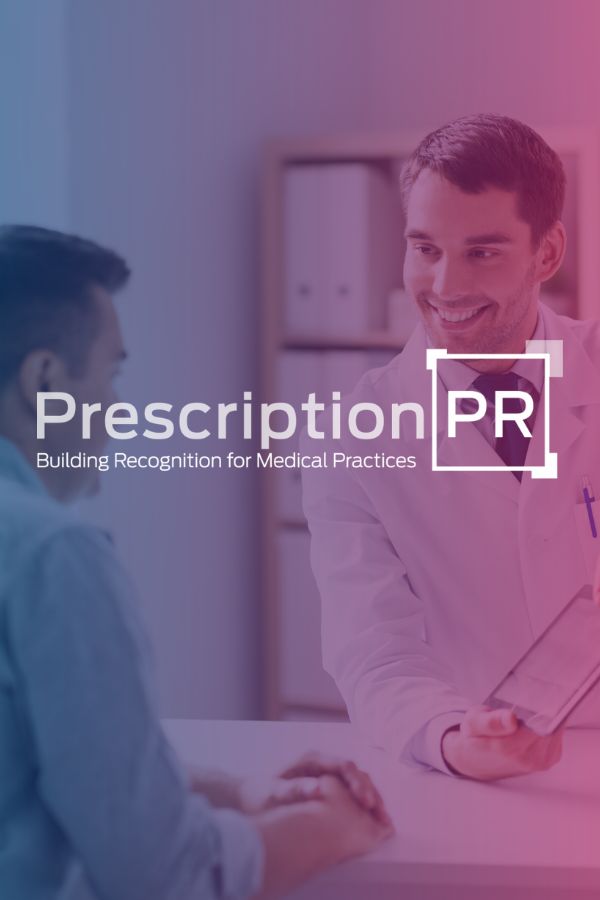Marketing in Healthcare Industry
Harnessing the Power of Healthcare Marketing
Here at Prescription PR, a New York-based company providing marketing in Healthcare industry, we understand the challenges & complexities healthcare providers face in retaining their patient population and reaching new ones. Patients have many options in competitive markets when selecting a provider or medical service for their needs. To succeed, you must compete with custom-tailored solutions designed by expert marketing professionals specializing in healthcare.
At Prescription PR, our top priority is helping healthcare organizations and professionals achieve their business goals. We offer a variety of healthcare marketing strategies that provide real solutions to everyday issues healthcare professionals face. If you want to learn the impact of marketing on modern healthcare businesses, contact our team.
In today’s digitally driven world, healthcare professionals face unique challenges when marketing their services effectively. The traditional approaches of healthcare marketing are no longer sufficient to capture the target audience’s attention. This article explores the transformative potential of web marketing strategies for medical practices. By leveraging digital platforms’ power and effective marketing techniques, healthcare providers can expand their reach, attract new patients, and thrive in the competitive healthcare industry.
The Changing Landscape of Healthcare Marketing has revolutionized how healthcare providers connect with their audience. It encompasses a range of strategies and techniques to enhance the visibility and reputation of medical practices. With a well-defined marketing strategy, high-quality healthcare providers can strategically position themselves to engage and attract prospective patients.
Our Digital Marketing Services
For many healthcare providers, marketing their business over the Internet is impossible. Taking time to learn more about digital marketing tactics is not always feasible for busy doctors and surgeons. Prescription PR is here, to provide powerful marketing solutions and strategies to the constantly evolving healthcare industry. We work diligently to create a healthcare marketing strategy that will yield the best results for your goals.
Defining a Comprehensive Marketing Plan: A successful digital marketing campaign begins with clearly understanding the target audience, unique value proposition, and marketing goals. A well-crafted marketing plan is a roadmap to guide healthcare providers in their internet marketing efforts.
Leveraging Search Engine Optimization (SEO): Optimizing the practice’s website for search engines helps improve its visibility in search results, ensuring that it appears when potential patients search for relevant healthcare services.
Expanding Marketing Channels: Engaging patients on digital platforms such as social media, email marketing, and content marketing enables healthcare providers to connect with their audience, share valuable information, and build trust.
Personalization and Targeted Marketing: Tailoring marketing messages and content to specific demographics and patient segments enhances marketing efforts’ effectiveness and fosters a personalized patient experience.
Harnessing the Power of Social Media: Establishing a solid presence on social media platforms allows medical practices to connect with patients, share educational content, and build an online community.
Content Marketing for Education and Engagement: Creating informative and valuable content positions medical practices as trusted sources of information, attracting and engaging healthcare consumers.
Leveraging Email Marketing: Email marketing campaigns provide an opportunity to communicate directly with patients, share updates, promote services, and nurture relationships.
Maximizing the Benefits of Digital Marketing in Healthcare

When it comes to healthcare advertising, it’s essential to make note of opportunities that will allow your healthcare business to reach new patients. Depending on your patient base and marketing budget, there are plenty of avenues for professionals to explore. Our team understands how to approach medical marketing, and we continue improving our marketing tactics daily.
Enhancing the Patient Experience: Digital healthcare marketing allows healthcare institutions to streamline patient communication, schedule online appointments, and offer convenient access to healthcare information and resources.
Strengthening the Healthcare Brand: Consistent branding across digital platforms helps establish a recognizable and trusted healthcare brand, setting medical practices apart from competitors.
Measuring Marketing Performance: Digital marketing tools and analytics provide valuable insights into the effectiveness of marketing campaigns, allowing healthcare providers to refine strategies based on data-driven decisions.
The Importance of Budgeted Marketing: Allocating a dedicated budget for online marketing ensures that healthcare facilities can invest in the necessary resources and technologies to drive growth and achieve marketing goals.
The Future of Healthcare Marketing: Embracing Digital Transformation
Adapting to the Ever-Evolving Healthcare Landscape: Healthcare is constantly evolving, and healthcare marketers must stay abreast of emerging trends and technologies to remain competitive.
Embracing Innovation: Internet marketing enables healthcare providers to leverage cutting-edge technologies such as telemedicine, artificial intelligence, and virtual reality to enhance patient experiences and deliver high-quality care.+
Collaboration and Partnerships: Collaborating with web marketing agencies and professionals specializing in healthcare marketing can provide medical practices with valuable expertise, industry insights, and innovative strategies.
Marketing in Healthcare Industry with Prescription PR
Digital marketing has become essential for healthcare providers to grow their practices and attract new patients. By embracing Internet marketing strategies, healthcare providers can elevate their online presence, engage with healthcare consumers, and build strong patient relationships.
In an ever-evolving healthcare landscape, integrating web marketing techniques is crucial for medical practices to thrive, provide seamless healthcare experiences, and stay ahead of the competition. With a well-designed online marketing strategy, medical practices can unlock the full potential of their services, contribute to better patient outcomes, and establish themselves as leaders in the healthcare field.
Frequently Asked Questions
About digital Marketing in the Healthcare Industry
Medical SEO refers to the process of optimizing a healthcare website to improve its visibility and rankings in search engine results. It involves various techniques such as keyword optimization, content creation, website structure improvement, and link building. Medical SEO is crucial for healthcare professionals because it helps them attract more online visibility, reach a wider audience, increase website traffic, and ultimately acquire more patients or clients.
Medical SEO is a specialized branch of SEO that focuses specifically on optimizing websites and online content related to healthcare services, medical practices, and medical professionals. It considers the unique challenges and regulations associated with the medical industry, such as patient privacy and medical ethics. Regular SEO, on the other hand, is a broader term that encompasses optimization strategies for all types of websites and industries.
Key factors to consider when optimizing a medical website for search engines include:
- Relevant keywords: Research and incorporate relevant medical keywords in your website content.
- Quality content: Create informative and valuable content that addresses the needs of your target audience.
- On-page optimization: Optimize page titles, meta descriptions, headings, and URL structures for search engines.
- Mobile-friendliness: Ensure your website is responsive and provides a seamless user experience on mobile devices.
- Page loading speed: Improve website performance to enhance user experience and search engine rankings.
- Backlinks: Build high-quality backlinks from reputable healthcare-related websites to increase your website’s authority.
Medical SEO can improve the online visibility and rankings of healthcare practices by optimizing their websites to appear higher in search engine results. When potential patients search for medical services, a well-optimized website is more likely to appear prominently, increasing the chances of attracting clicks and visits. By implementing effective medical SEO strategies, healthcare practices can improve their visibility, reach a larger audience, and ultimately generate more leads and patient inquiries.
Some common SEO mistakes to avoid in the medical industry include:
- Keyword stuffing: Overusing keywords in an unnatural manner, can harm your search engine rankings.
- Duplicate content: Publishing identical or similar content across multiple pages or websites, leading to lower rankings.
- Neglecting local SEO: Failing to optimize your website for local search queries, which can reduce visibility in your area.
- Ignoring mobile optimization: Neglecting to create a mobile-friendly website, resulting in a poor user experience and lower rankings.
- Neglecting user experience: Focusing solely on search engine rankings without considering the usability and experience of website visitors.
The time it takes to see results from medical SEO efforts can vary depending on several factors, including the competitiveness of keywords, the quality of optimization, and the website’s authority. Generally, it may take a few months to start seeing noticeable improvements in rankings and organic traffic. However, it’s important to note that SEO is an ongoing process, and continuous efforts are required to maintain and improve rankings over time.
Some best practices for optimizing medical content for search engines include:
- Conduct thorough keyword research to identify relevant medical terms and phrases.
- Incorporating keywords naturally in titles, headings, and throughout the content.
- Creating high-quality, informative, and engaging content that addresses the needs of your target audience.
- Using descriptive and concise meta tags (title tags and meta descriptions) to optimize search engine snippets.
- Optimizing images with relevant alt text and file names.
- Structuring content with appropriate headings (H1, H2, etc.) to improve readability and SEO.
While it’s possible to handle medical SEO in-house, hiring a professional SEO agency with experience in the medical industry can provide several benefits. SEO agencies have expertise in the latest SEO strategies, tools, and techniques. They can develop a comprehensive SEO strategy tailored to your medical practice, conduct in-depth keyword research, perform technical optimizations, and monitor and analyze the effectiveness of your SEO efforts. However, the decision to hire an agency or handle it in-house depends on your resources, budget, and level of expertise in SEO.
Yes, there are specific guidelines and regulations to follow when optimizing medical websites for search engines. Healthcare professionals and organizations must ensure compliance with privacy laws, such as HIPAA in the United States. It’s important to maintain patient confidentiality and avoid disclosing personal health information in the optimization process. Additionally, healthcare websites should adhere to advertising regulations and guidelines set by relevant medical boards and organizations.
Website design and user experience play a crucial role in medical SEO. Search engines consider user experience signals, such as page loading speed, mobile-friendliness, and overall website usability, when determining rankings. A well-designed and user-friendly website not only improves search engine visibility but also enhances the overall user experience, leading to longer visit durations, lower bounce rates, and increased engagement. It’s important to have intuitive navigation, clear calls to action, and responsive design to cater to the needs of both search engines and website visitors.
Healthcare professionals can use social media and online reviews to enhance their medical SEO strategy by:
- Actively engaging on social media platforms to promote their expertise, share valuable content, and interact with patients.
- Encouraging satisfied patients to leave positive reviews on reputable review sites, which can improve online reputation and search engine rankings.
- Monitoring and responding to reviews, both positive and negative, to demonstrate engagement and patient-centered care.
- Sharing content from the website on social media platforms to increase visibility, drive traffic, and generate backlinks.
Some effective strategies for generating backlinks to a medical website include:
- Creating high-quality, informative, and shareable content that naturally attracts backlinks from other websites.
- Building relationships with other reputable healthcare websites, organizations, and professionals for potential collaboration and link opportunities.
- Guest blogging on authoritative healthcare websites and including relevant backlinks within the content.
- Participating in medical forums, discussions, and online communities, where you can share your expertise and link back to your website when relevant.
- Publishing research papers, case studies, or unique medical content that may attract citations and backlinks from academic and industry sources.
There are several keyword research techniques and tools that can be used for medical SEO:
- Using keyword research tools like Google Keyword Planner, SEMrush, or Moz Keyword Explorer to identify relevant medical keywords with search volume and competitiveness data.
- Analyzing competitor websites to identify the keywords they are targeting and incorporating those into your research.
- Monitoring industry-specific forums, Q&A platforms, and social media discussions to identify common questions and topics related to medical services.
- Conducting patient surveys or interviews to understand the language and terms they use when searching for medical information.







